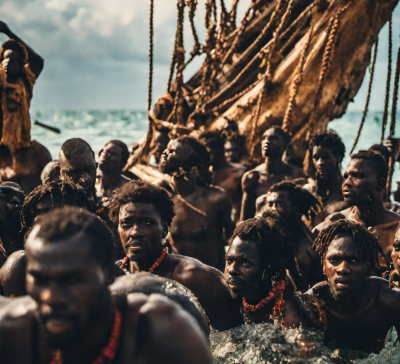Igbo Landing: America’s First Freedom March and Mass Suicide

These valiant Igbo men chose freedom and death by drowning instead of a life of slavery (Imagined by Gencraft)
Igbo Landing: America’s First Freedom March
In May 1803, a remarkable act of resistance unfolded on the shores of St. Simons Island, Georgia. A group of enslaved Igbo people from present-day Nigeria chose death over the chains of slavery, leaving an indelible mark on American history.
The Igbo People: A Legacy of Strength
The Igbo, originating from southeastern Nigeria, were known for their resilience and rich cultural heritage. Their society was organized around village communities, with a strong emphasis on kinship and spirituality. Skilled in agriculture, blacksmithing, and trade, the Igbo were a formidable presence in West Africa.
However, the transatlantic slave trade disrupted their way of life. European traders, seeking labor for plantations in the Americas, targeted the Bight of Biafra, a region heavily populated by the Igbo. Between the 17th and 19th centuries, thousands of Igbo people were forcibly taken from their homeland and sold into slavery.
The Middle Passage: A Journey of Suffering
The captives endured the harrowing Middle Passage, a transatlantic voyage marked by overcrowding, disease, and abuse. Many did not survive the journey. Those who did were often sold at ports like Savannah, Georgia, and transported to plantations along the southeastern coast of the United States.v
In 1803, approximately 75 Igbo captives were purchased by slave merchants John Couper and Thomas Spalding. They were loaded onto a small essel, the Schooner York, for transport to St. Simons Island.
The Revolt at Dunbar Creek
During the voyage, the Igbo captives seized an opportunity to rebel. They overpowered the crew, causing the ship to run aground in Dunbar Creek. Led by a high chief, the group made a fateful decision.
According to oral traditions, the Igbo marched into the creek, singing in their native language. They invoked the spirit of their homeland, expressing a desire to return to their ancestors. Rather than submit to enslavement, they chose to drown together in the waters of Dunbar Creek.
Eyewitness Accounts and Historical Records
Roswell King, an overseer on a nearby plantation, documented the incident. He reported that only 13 bodies were recovered, suggesting that some captives may have escaped or been recaptured. Despite the limited records, the event became a powerful symbol of resistance.
For years, the story of Igbo Landing was passed down through African American oral traditions, particularly among the Gullah Geechee people of the southeastern United States. These narratives preserved the memory of the Igbo’s defiance and their ultimate sacrifice.
Cultural Impact and Legacy
The events at Igbo Landing have inspired numerous works of art, literature, and music. Toni Morrison’s novel “Song of Solomon” and Beyoncé’s visual album “Lemonade” draw upon the themes of resistance and liberation associated with the Igbo’s story.
In 2002, the African American community of St. Simons Island organized a two-day celebration to honor the Igbo ancestors. The commemoration included traditional ceremonies, storytelling, and educational programs. Today, schools in the area teach the history of Igbo Landing as part of their curriculum
A Symbol of Freedom
The mass suicide at Igbo Landing is often referred to as America’s first freedom march. It stands as a testament to the human spirit’s refusal to accept bondage. The Igbo’s choice to embrace death over enslavement resonates as a powerful act of self-determination and courage.
Remembering Igbo Landing Today
Efforts continue to preserve and honor the legacy of Igbo Landing. In 2022, a historical marker was erected at the site, providing visitors with information about the event’s significance. Annual commemorations and educational initiatives ensure that the story of the Igbo’s resistance remains alive for future generations.
Conclusion
The story of Igbo Landing is a poignant reminder of the atrocities of slavery and the resilience of those who endured it. By choosing death over subjugation, the Igbo captives asserted their humanity in the face of dehumanization. Around the world, their legacy continues to inspire movements for freedom and justice.
Read more about resistance to slavery and colonialism
